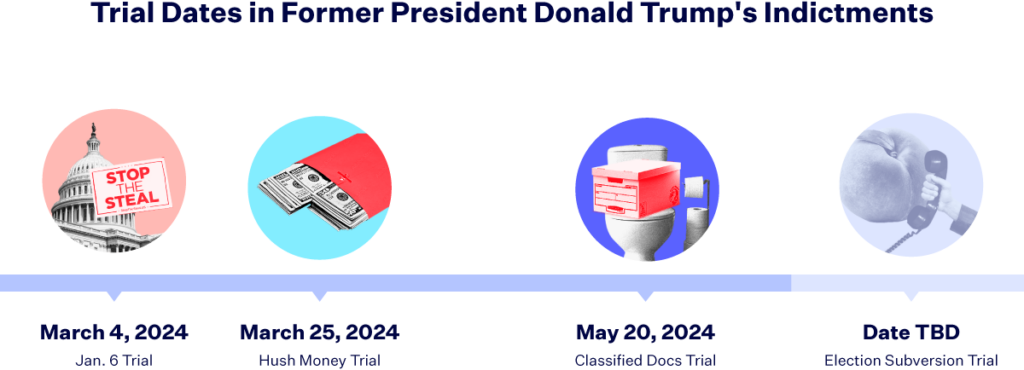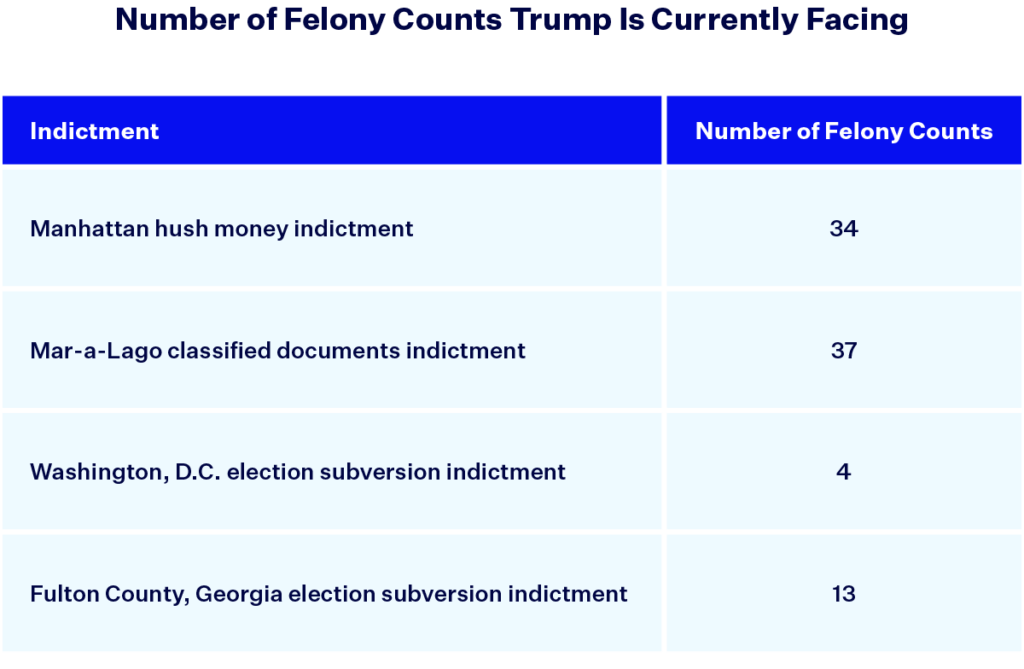Former President Donald Trump has been indicted four times, making him the first former president to ever be criminally indicted. Focusing on Trump’s election subversion indictments, Democracy Docket is tracking the indictment out of special counsel Jack Smith’s office in Washington, D.C. and the indictment from Fulton County District Attorney Fani Willis (D) in Georgia. Both charges are related to the events after the 2020 presidential election and Trump’s nefarious efforts to remain in power, despite losing the election.
After refusing to accept defeat in November 2020, Trump and his allies filed over 60 post-election lawsuits challenging the results of the 2020 election in states across the country, including in key battleground states like Arizona, Michigan, Pennsylvania and Wisconsin. They lost all but one of the lawsuits, including a case at the U.S. Supreme Court that sought to invalidate election results in multiple states.
This resource page has everything you need to know about Trump’s two election subversion indictments, including the latest Democracy Docket content and case pages with the relevant filings.

Jan. 6 Federal Indictment
2023
More than two and a half years after Trump launched a full-scale effort to overturn his election loss, including inciting the Jan. 6 insurrection, the former president’s journey to accountability finally began in early August.
On Aug. 1, a Washington, D.C. federal grand jury indicted Trump on four charges relating to his post-election conduct. The indictment came as a result of a special counsel investigation led by former Assistant U.S. Attorney Jack Smith, who has also separately led the probe into Trump’s mishandling of classified documents.
In the searing indictment, prosecutors wrote that Trump “pursued unlawful means of discounting legitimate votes and subverting the election results,” and in doing so “perpetrated three criminal conspiracies.”
The conspiracy charges include:
- Conspiracy to defraud the United States;
- Conspiracy to obstruct an official proceeding;
- Obstruction of and attempt to obstruct an official proceeding and
- Conspiracy against the right to vote and have one’s vote counted.
At his Aug. 3 arraignment in Washington D.C., Trump pleaded not guilty and on Aug. 17, he asked for an April 2026 trial date.
On Aug. 28, U.S. District Judge for the District of Columbia Tanya Chutkan, who was appointed by former President Barack Obama, set the trial for March 4, 2024, the day before Super Tuesday.
On Sept. 11, Trump filed a motion requesting Judge Tanya Chutkan recuse herself, arguing that her previous comments about Jan. 6 “unavoidably taint these proceedings, regardless of outcome.” On Sept. 28, Chutkan denied the request.
On Oct. 17, the court entered a gag order prohibiting Trump from making public statements about U.S. Department of Justice attorneys, the court’s staff and witnesses. Trump appealed the order to the U.S. Circuit Court of Appeals for the D.C. Circuit the same day.
On Oct. 20, Chutkan temporarily lifted the narrow gag order previously imposed on Trump while she considered a motion from Trump’s lawyers to suspend the gag order entirely pending Trump’s appeal to the U.S. Court of Appeals for the D.C. Circuit.
On Oct. 23, Trump filed a litany of documents outlining various reasons he felt the case should be thrown out as part of three motions to dismiss the case. Among the arguments, Trump argued the case should be thrown out because he was already acquitted on some of the same charges in the U.S. Senate and that Trump’s comments at the heart of the indictment were core political speech protected by the First Amendment.
On Dec. 1, Chutkan denied the motion to dismiss and rejected Trump’s argument that the U.S. Constitution grants him absolute immunity from criminal prosecution for official acts. Chutkan determined the Constitution does not support Trump’s argument.
On Dec. 23, Trump asked the D.C. U.S. Circuit Court of Appeals to overturn Chutkan’s decision and toss the election interference case against him.
2024
On Feb. 6, the federal appeals court affirmed Chutkan’s ruling, holding that Trump’s immunity argument is “unsupported by precedent, history or the text and structure of the Constitution.”
On Feb. 28, the U.S. Supreme Court agreed to hear Trump’s immunity argument. The Court said it would weigh this question: “Whether and if so to what extent does a former President enjoy presidential immunity from criminal prosecution for conduct alleged to involve official acts during his tenure in office.”
On April 25, the U.S. Supreme Court held oral argument on the question of whether a former president (Trump) is absolutely immune from criminal prosecution for official acts. Trump’s attorneys argued that only Congress has the authority to judge his official acts. Smith’s team said “there is no immunity that is in the Constitution, unless this Court creates it.”
On July 1, the Court determined in a 6-3 decision that while the president doesn’t enjoy immunity for unofficial acts, he is at least entitled to presumptive immunity from prosecution for his official acts. “That immunity applies equally to all occupants of the Oval Office,” the decision said.
Find the case filings and latest updates here.
More reading
Georgia Election Subversion Indictment
2023
Just two weeks after Trump was indicted in Washington, D.C., a grand jury in Fulton County, Georgia indicted the former president on 13 charges brought by District Attorney Fani Willis (D) for Trump’s efforts to overturn the 2020 election results in Georgia.
The 98-page indictment was returned after more than two years of investigation by the district attorney’s office and includes 41 total counts. The indictment names 18 defendants in addition to Trump including: Rudy Giuliani, John Eastman, Mark Meadows, Kenneth Chesebro, Jeffrey Clark, Jenna Ellis, Sidney Powell and 30 unindicted, unnamed co-conspirators.
Of Trump’s 13 charges, the most notable is Count 1, “Violation of the Georgia RICO Act,” an expansive racketeering law, which allows prosecutors to lay out a sweeping narrative, namely, that Trump and the defendants “refused to accept that Trump lost, and they knowingly and willfully joined a conspiracy to unlawfully change the outcome of the election in favor of Trump.”
The indictment goes on to list an impressive 161 acts “committed in furtherance of the conspiracy alleged.” Historically, the federal RICO statute has been used to take down white supremacist and nationalist organizations engaging in activities outside of the scope of the First Amendment.
The trial date has yet to be set, but Willis has requested a start date of March 4, 2024. Prosecutors have said that the trial will last four months. On Aug. 31, Trump pleaded not guilty, waiving his right to an arraignment. All 19 defendants pleaded not guilty and waived their right to an in-person arraignment ahead of the Sept. 6 deadline.
On Sep. 29, Georgia bail bondsman Scott Hall was the first defendant to reach a plea deal with county prosecutors. Hall pleaded guilty to five misdemeanor charges of conspiracy to commit intentional interference with performance of election duties and agreed to serve five years of probation and testify in further proceedings, among other requirements.
On Oct. 19, former Trump lawyer Sidney Powell pleaded guilty to six misdemeanor charges of conspiracy to commit intentional interference with performance of election duties as part of a plea deal reached with county prosecutors.
On Oct. 20, another former Trump lawyer, Kenneth Chesebro, who led an attempt to submit a false slate of Georgia electors in 2020, pleaded guilty to a felony count of conspiracy to file false documents.
On Oct. 24, Jenna Ellis, who also served as an attorney for Trump during his efforts to overturn the results of the 2020 presidential election, pleaded guilty to a single felony count of aiding and abetting false statements and writings.
2024
On Jan. 18, Fulton County Superior Judge Scott McAfee set a Feb. 15 hearing on the issue of whether District Attorney Fani Willis had an improper relationship with special prosecutor Nathan Wade, which could potentially impact the case. This came after Trump co-defendant Michael Roman filed a motion seeking to have Willis disqualified from the case.
On March 15, McAfee ruled that either Willis or Wade must step down but did not dismiss the indictment. Wade resigned.
On March 29, Trump and his co-defendants appealed the decision to the Georgia Court of Appeals.
On May 8, the Georgia Court of Appeals agreed to hear Trump’s appeal of McAfee’s decision.
On June 5, the state appeals court indefinitely postponed the trial against Trump and his co-defendants.
Find the case filings and latest updates here.
More reading

In May of 2024, a New York jury convicted Trump of 34 felonies in connection with a hush money payment made to Stormy Daniels in 2016. Sentencing is scheduled for Sept. 18. A federal indictment against Trump in Florida that stemmed from his mishandling of classified documents was dismissed in July.
The Texas case — the most profoundly anti-democratic act in the post-election period — galvanized the Republican political and legal community behind Trump’s plan to steal the 2020 election.
Last updated: October 25, 2023 4:00 P.M. EST